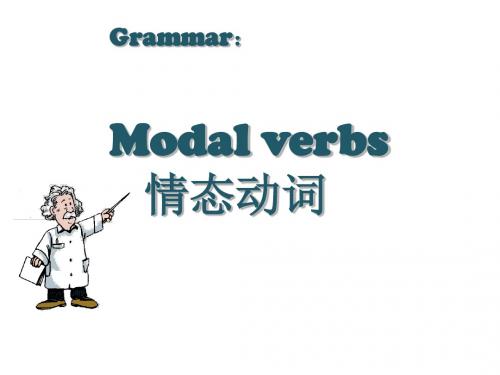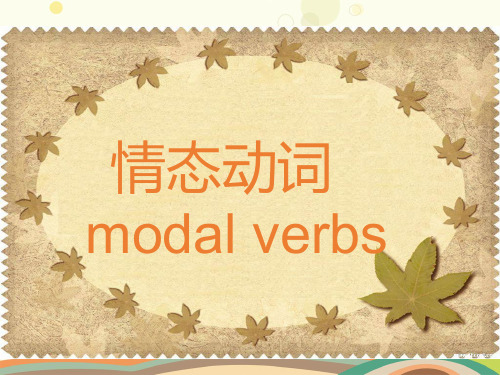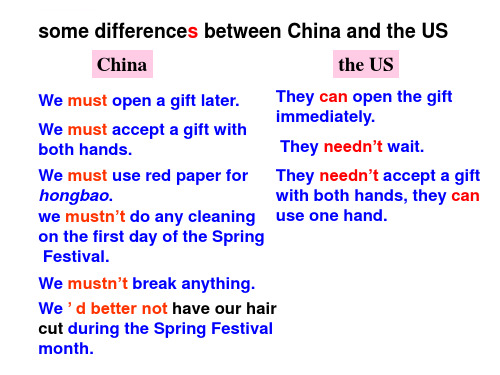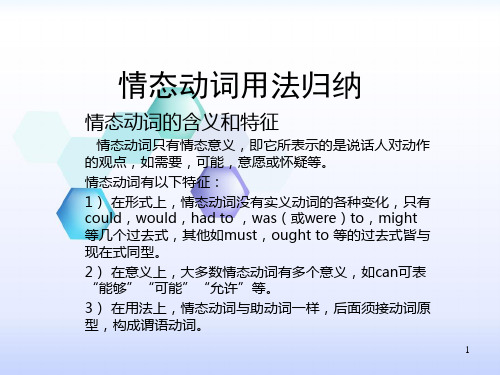情态动词用法总结(课堂PPT)
合集下载
情态动词讲解精ppt课件

例句
will/would
详细描述:will 表示现在的意愿或 预测,would 表示过去的或虚拟 的意愿或预测。
1. I will help you with your project.(我会帮助你完成你的项 目。)
总结词:表示意愿或预测
例句
2. They would have gone to the party if they had known about it earlier.(如果他们早点 知道,他们就会去参加聚会。)
表示意愿
情态动词+动词原形,如 would like to go,表示 某人想要去。
形式变化
基本形式
情态动词的基本形式包括 现在时、过去时和将来时 。
过去式
情态动词的过去式通常是 在基本形式后面加-d或ed,如could have done 、should have done等。
将来时
情态动词的将来时通常是 在基本形式后面加-will或shall,如will be able to 、shall have to等。
may与might的区别与联系
总结词
may表示现在的许可或可能性;might表示过去的可能性或许可。
详细描述
may用于肯定句中,表示许可或可能性,例如“You may use this room.”(你可以使用这个房间。 )“The book may be in the library.”(这本书可能在图书馆里。)might表示过去的可能性,常 用于过去时态的句子中,例如“He might come tomorrow.”(他明天可能来。)
未必、很难说
She might not agree with us.
表示虚拟语气
will/would
详细描述:will 表示现在的意愿或 预测,would 表示过去的或虚拟 的意愿或预测。
1. I will help you with your project.(我会帮助你完成你的项 目。)
总结词:表示意愿或预测
例句
2. They would have gone to the party if they had known about it earlier.(如果他们早点 知道,他们就会去参加聚会。)
表示意愿
情态动词+动词原形,如 would like to go,表示 某人想要去。
形式变化
基本形式
情态动词的基本形式包括 现在时、过去时和将来时 。
过去式
情态动词的过去式通常是 在基本形式后面加-d或ed,如could have done 、should have done等。
将来时
情态动词的将来时通常是 在基本形式后面加-will或shall,如will be able to 、shall have to等。
may与might的区别与联系
总结词
may表示现在的许可或可能性;might表示过去的可能性或许可。
详细描述
may用于肯定句中,表示许可或可能性,例如“You may use this room.”(你可以使用这个房间。 )“The book may be in the library.”(这本书可能在图书馆里。)might表示过去的可能性,常 用于过去时态的句子中,例如“He might come tomorrow.”(他明天可能来。)
未必、很难说
She might not agree with us.
表示虚拟语气
情态动词语法讲解PPT课件

2表示“许可”和“不许”
a)请求对方“许可”可用can, could, may, might.
may/might较正式,could/might较委婉
表示给予“许可”通常用can/may,而不用 could/might
Could I use your phone? Yes, of course you can. Might I trouble you for a light? You may indeed.
表示将来的“必须”,常用have to的一定 形式(will/shall have to) 比较:
•We must do it again.(表示现在)
•We’ll have to do it again.(表示将来)
•表示过去的“必须”,常用had to
•I had to leave at six yesterday.
•They must be home by now.(他们现在一定到家了)
will/would表示“推测”可有三种情况
1)对特定事态的推测
A: Who’s that man over there? B: That will be George, no doubt. C: That would be George, I except.
• Can they have missed the bus?
• Yes, they may have.
may not重音落在助动词上,表示 “不可能”,重音落在否定词上,表 示“不许可” , 比较:
•He may not go tomorrow.
•He may not go tomorrow.
•所以在书面语中,表示“不可能” 常用can’t
小学情态动词用法ppt课件

• I could swim when I was seven years old.
• (5)can开头的一般疑问句 以can和can’t 回答could开头的一般疑问句 以could和 couldn’t回答
为深入学习习近平新时代中国特色社 会主义 思想和 党的十 九大精 神,贯彻 全国教 育大会 精神,充 分发挥 中小学 图书室 育人功 能
二、特征
• 1.有一定词义,但不能单独作谓语,必须和行 为动词或系动词连用,构成谓语。
• 2.无人称和数的变化(have to例外:用于第三 人称单数时用has to)
• He has to stay here. • 3.后面接动词原形 • She should stay at home. • 4.具有助动词的作用,可用来构成否定句、疑
句中
• He can’t be in classroom. • (3)表示请求或允许,口语,“可以”相当
may
• You can go now.
为深入学习习近平新时代中国特色社 会主义 思想和 党的十 九大精 神,贯彻 全国教 育大会 精神,充 分发挥 中小学 图书室 育人功 能
• (4)could 是can的过去式,可以 会主义 思想和 党的十 九大精 神,贯彻 全国教 育大会 精神,充 分发挥 中小学 图书室 育人功 能
• 4.can’t 和 mustn’t • 否定推测:can’t “不可能” • mustn’t “禁止,不允许”,不能用于推
测 • must肯定句中表推测,“一定”
问句及简明回答 • --Can you sing an English song? • --yes, I can.
为深入学习习近平新时代中国特色社 会主义 思想和 党的十 九大精 神,贯彻 全国教 育大会 精神,充 分发挥 中小学 图书室 育人功 能
• (5)can开头的一般疑问句 以can和can’t 回答could开头的一般疑问句 以could和 couldn’t回答
为深入学习习近平新时代中国特色社 会主义 思想和 党的十 九大精 神,贯彻 全国教 育大会 精神,充 分发挥 中小学 图书室 育人功 能
二、特征
• 1.有一定词义,但不能单独作谓语,必须和行 为动词或系动词连用,构成谓语。
• 2.无人称和数的变化(have to例外:用于第三 人称单数时用has to)
• He has to stay here. • 3.后面接动词原形 • She should stay at home. • 4.具有助动词的作用,可用来构成否定句、疑
句中
• He can’t be in classroom. • (3)表示请求或允许,口语,“可以”相当
may
• You can go now.
为深入学习习近平新时代中国特色社 会主义 思想和 党的十 九大精 神,贯彻 全国教 育大会 精神,充 分发挥 中小学 图书室 育人功 能
• (4)could 是can的过去式,可以 会主义 思想和 党的十 九大精 神,贯彻 全国教 育大会 精神,充 分发挥 中小学 图书室 育人功 能
• 4.can’t 和 mustn’t • 否定推测:can’t “不可能” • mustn’t “禁止,不允许”,不能用于推
测 • must肯定句中表推测,“一定”
问句及简明回答 • --Can you sing an English song? • --yes, I can.
为深入学习习近平新时代中国特色社 会主义 思想和 党的十 九大精 神,贯彻 全国教 育大会 精神,充 分发挥 中小学 图书室 育人功 能
情态动词-完整版PPT课件

情态动词 modal verbs
1.情态动词的用法特点
1)情态动词 除 ought 和 have 外,后面只能 接不带to 的不定式。 2)情态动词没有人称,数的变化,即情态动 词第三人称单数不加-s。 3)情态动词没有非谓语形式,即没有不定式, 分词等形式。
can could may might shall should must will would ought to
have to dare need used to
表示推测
情态动词
不表示推测
2.表示推测——情态动词的重要用法.
情态动词
对将来
对现在
对过去
m肯ust/定sho的uld 推测
+ V. + V. + have done
常见must be + be doi定的推测 can’t, couldn’t
疑问的推测
can, could
+ V.
+ V.
+ have done
+ be doing
可以用not表示“可能不”
+V.
+ V.
+ have done
+ be doing
+ V.
+ V.
+ have done
+ be doing
不同的“肯定”程度可按下列层次排列: He is at home. (事实) He must be at home.(非常肯定的推断) He ought to be at home.(很可能) He could be at home.(很可能) He may be at home.(仅仅可能而已) He might be at home.(或许, 非常不确定) He might not be at home.(也许不在家) He may not be at home. (比might可能) He couldn’t be at home.(很可能不在家) He can’t be at home.(一定不在家)
1.情态动词的用法特点
1)情态动词 除 ought 和 have 外,后面只能 接不带to 的不定式。 2)情态动词没有人称,数的变化,即情态动 词第三人称单数不加-s。 3)情态动词没有非谓语形式,即没有不定式, 分词等形式。
can could may might shall should must will would ought to
have to dare need used to
表示推测
情态动词
不表示推测
2.表示推测——情态动词的重要用法.
情态动词
对将来
对现在
对过去
m肯ust/定sho的uld 推测
+ V. + V. + have done
常见must be + be doi定的推测 can’t, couldn’t
疑问的推测
can, could
+ V.
+ V.
+ have done
+ be doing
可以用not表示“可能不”
+V.
+ V.
+ have done
+ be doing
+ V.
+ V.
+ have done
+ be doing
不同的“肯定”程度可按下列层次排列: He is at home. (事实) He must be at home.(非常肯定的推断) He ought to be at home.(很可能) He could be at home.(很可能) He may be at home.(仅仅可能而已) He might be at home.(或许, 非常不确定) He might not be at home.(也许不在家) He may not be at home. (比might可能) He couldn’t be at home.(很可能不在家) He can’t be at home.(一定不在家)
高中英语情态动词各种用法课件(共47张PPT)

一 、表能力 :表现在的或一般的能力:表示 现在的或一般的能力用can 或 be able to. 一 般的能力是指你无论什么时候做什么事情就 能做到的能力。表示现在的能力或一般的能 力时,can比be able to 更普遍。
A computer can’t think for itself; it must be told what to do. (表示一般的能力)
This can’t / couldn’t be done by him. (表示不 相信)
He could be on his way home now. (could 不 如 may / might常用)
Can this be done by him? (表示一种疑惑、 惊讶)
(3)would, could, should, might 并不一定 与过去的时间有关,而是表示可能性弱于他 们相应的现在形式。如:
do something / succeeded in doing sth.
The fire spread through the hotel very
quickly but everyone was able to get out. (过去有能力并成功地做了某事)
(3) could have + 过去分词,表示过去有 能力做但未做。
表示对过去已经发生的行为进行推测,意为 “想必 / 准是/ 一定做了某事
It must have rained last night, for the road was quite muddy.
The lights were out. They must have been asleep.
2. can have done
情态动词的用法PPT课件

“雪亮工程"是以区(县)、乡(镇) 、村( 社区) 三级综 治中心 为指挥 平台、 以综治 信息化 为支撑 、以网 格化管 理为基 础、以 公共安 全视频 监控联 网应用 为重点 的“群 众性治 安防控 工程” 。
Exercises:
My brother was very ill, so I ( had to) call the doctor in the middle of the night.
“雪亮工程"是以区(县)、乡(镇) 、村( 社区) 三级综 治中心 为指挥 平台、 以综治 信息化 为支撑 、以网 格化管 理为基 础、以 公共安 全视频 监控联 网应用 为重点 的“群 众性治 安防控 工程” 。
some differences between China and the US
China
3 Underline the correct words.
注意: might为may的过去式,但也可以代替may, 语气较为婉转客气或更加不肯定。
“雪亮工程"是以区(县)、乡(镇) 、村( 社区) 三级综 治中心 为指挥 平台、 以综治 信息化 为支撑 、以网 格化管 理为基 础、以 公共安 全视频 监控联 网应用 为重点 的“群 众性治 安防控 工程” 。
— For your health, I’m afraid you ______. (2011贵州安顺)
A. may B. can C. have to D. need
“雪亮工程"是以区(县)、乡(镇) 、村( 社区) 三级综 治中心 为指挥 平台、 以综治 信息化 为支撑 、以网 格化管 理为基 础、以 公共安 全视频 监控联 网应用 为重点 的“群 众性治 安防控 工程” 。
初中英语-情态动词-课件(共31张PPT)

二、情态动词的用法 4.dare和need
need “需要” dare“敢” 可作情态动词也可作实义动词
• (2)当实义动词使用时,有人称和时态的变化 • e.g.You don't need to do it yourself. • He did not dare(to) look up.
• ——Can you drive a car at present? • ——I_____ do so in the busy street.
• A.may not C.daren't
B.don't dare D.needn't
二、情态动词的用法 ed to和had better
• (1)used to表示过去的习惯动作或状态,现 已不存在。
• e.g.There used to be our playground.
二、情态动词的用法 ed to和had better
time. • I'll not be able to come this afternoon.
二、情态动词的用法
• (2)表客观可能性,在疑问句中表示请求或许可 • e.g.Man can not live without air. • Can I use your pen?
• *could是can的过去时,主要用于疑问句,表示语气委婉。 • 肯定回答用 • 否定回答可用
C.should tell
D.should have told
二、情态动词的用法 7.will和would
(1)表意愿,用于各种人称的陈述句。
• e.g.I will do anything for you. • If you will read the book,I'll lend it to you.
情态动词用法归纳(全)PPT教学课件

如果天不那么黑,你可能从这儿望见它的。(实际上已望不见)
4
3)表示请求和允许.
eg. You can borrow my bike tomorrow 明天你可以借用我的自行车
表这个意义时,can 用于疑问句时表要求,用于否定句时表不许,如:
Can you lend me a hand ?
This sort of thing can't go on!
1
• 一: can (could)的形式和用法 时态 现在时 过去式 肯定式 can could 否定式 cannot could not 缩略否定式 can't couldn't
2
一、 can, could
1) 表示能力(体力、知识、技能)。
Can you lift this heavy box?(体力)
情态动词用法归纳
情态动词的含义和特征
情态动词只有情态意义,即它所表示的是说话人对动作 的观点,如需要,可能,意愿或怀疑等。 情态动词有以下特征: 1) 在形式上,情态动词没有实义动词的各种变化,只有 could,would,had to ,was(或were)to,might 等几个过去式,其他如must,ought to 等的过去式皆与 现在式同型。 2) 在意义上,大多数情态动词有多个意义,如can可表 “能够”“可能”“允许”等。 3) 在用法上,情态动词与助动词一样,后面须接动an speak three languages.(知识)
Can you skate?(技能) 备注:此时可用be able to代替。Can只有一般现在时和一般过 去式;而be able to则有更多的时态。 eg: I’ll not be able to come this afternoon.
- 1、下载文档前请自行甄别文档内容的完整性,平台不提供额外的编辑、内容补充、找答案等附加服务。
- 2、"仅部分预览"的文档,不可在线预览部分如存在完整性等问题,可反馈申请退款(可完整预览的文档不适用该条件!)。
- 3、如文档侵犯您的权益,请联系客服反馈,我们会尽快为您处理(人工客服工作时间:9:00-18:30)。
10)Where can Mary have gone?
4
can/be able to
can表示“能够”时与短语be able to同义, 但can只用于一般现在时或过去时,而后 者可用于各种时态。另外,can表示个人 有某种能力,而be able to表示某人通过努 力、克服困难做成某事,相当于succeed in doing sth.;
C. mustn’t have attended D. shouldn’t have attended
6
5. There’s someone outside. Who __A__it be?
A. can B. need
C. may D. must
6. ----Is Jack on duty today?
tomorrow afternoon. ---- They __B___ be ready by 12:00
A. can B. should
C. might D. need
c 3. We ______ last night, but we went to the concert instead.
A. must have studied B. might study
6) How can you believe such a liar like him?
5. can’t/ couldn’t have done 表示对过去情况的否定推 测,意为“过去不可能做过某事”
7) Susan can’t have written a report like this. 8) She can’t have gone to school, it is Sunday .
A. can B. need
C. dare D. must
8. The fire spread through the hotel very quickly, but everyone ___C____ get away.
A. were able to B. would
C. was able to D. could
却干了
Eg: You should have invited me to the party yesterday. You are right. I Should have thought of that. You shouldn’t have eaten all the cakes in one day.
deep in thought. 4) We would sit around Grandpa after supper, listening to his stories.
12
1. If you __B__ wait here for another 5 minutes, our manager
A. can B. should
C. may D. must
3. ---- I stayed at a hotel while in New York.
---- Oh, did you? You __A__ with Barbara.
A. could have stayed
B. could stay
1.表能力,意为“能,能够”,can指现在,could指过去。
1) Some of us can use the computer now, but we couldn’t last year.
2. 表示推测,意为“可能”“或许”,用于疑问句 或否定句,can’t和couldn’t意为“不可能”。
2) Can she be in the computer center? 3) I though what he said could not be true.
but he isn’t very sure yet.
A. must
B. may
C. can
D. will
10
3. will 与would
1. 用于第二人称的疑问句中,表“请求、建议”等,用 would 比用will 委婉,客气些
Eg: 1)Will you lend me your book? 2) Would you like a cup of tea?
11
3.表示习惯性动作。 译作 “总是、惯于”, will 指现在 常常,would 指过去常常。
Eg: 1)This man is strange. He will sit for hours without saying anything.
2) Mary will keep asking some silly questions. 3) Every evening, she would sit by window,
7
2. may 与might
1. 表示“许可”或“请求”,有“可以”的意思,口语中 常用 might 代 may ,表示委婉语气。 否定回答时用“must not”表“禁止,阻止”, 不用 “may not”. “may not” 表示“可能不” 。
Eg: 1)--- May I watch TV after supper? --- Yes, you may. / No, you mustn’t. 2) Today is Sunday. She may not in her office now.
2. 表示可能性。 意为“或许,可能” might 比 may 可能性小。
Eg: 1) The girl might be sleeping this time of day. 2) They may be in the library now.
8
3.may/might have done 表示对过去发生过的事情的推测, 意为“可能已经做过某事”
C. would stay
D. must have stayed
4. My sister met him at the Grand Theater yesterday
afternoon, so he __A__ your lecture.
A. couldn’t have attended B. needn’t have attended
2. 用于表示意志或意愿,意为“会,愿意” 。will 指现在,而 would 指 过去。用于否定句中,表示 “不会、不肯、不乐意”。
Eg: 1) I won’t do that again. 2) They said that they would help us. 3) No matter what I said, he won’t listen to me.
1
情态动词的语法特征
1)情态动词表说话人的某种感情或语气,对 某一动作或状态的某种态度。
2) 情态动词不能单独做谓语, 后面只能接动词
原形,ght to和have to除外,。
3) 情态动词没有人称, 数的变化, 但有些情态 动词, 如can、will、have to、may等有过去式。
2
1. can 与could
----It _C___ be him. It’s his turn tomorrow.
A. mustn’t B. won’t
C. can’t D. needn’t
7. It is usually warm in my hometown, but it _A___be rather
cold sometimes.
Eg: I can’t find my sunglasses. I may/might have left them in your office.
4. may/ might as well + 动词原形 “…还是…的好” “不妨干某事” Eg: You may as well go and have a look.
will come back.
A. should B. will
C. need D. must
2. When he was there, he__A____ go to that coffee shop at the
corner after work every day.
A. would B. should C. had better D. might
2. 两者都可表示推测,表示很大的可能性。意为 “可 能、按理该…”
Eg: 1) It’s 7 o’clock, he should be at home.
2) They should have arrived by now.
14
3. ought to/should have done 本应该干某事可事实未干 oughtn’t to/shouldn’t have done本不该干某事可事实
4. Should可以用来表示说话人的惊奇等情感,意为 “竟然,居然”
Eg: 1) It’s surprising that Mary should love such a person. 2) It’s unbelievable that the boy should sing such a
beautiful song. 15
1.You can’t imagine that a well-behaved gentleman __B___
be so rude to a lady.
A. can B. should
C. may D. must
2. ---- When can I come for the photos? I need them
C. ought to have studied D. would study
16
5. shall
1. Shall用于第一、三人称的疑问句中,表示说话人征 求对方的意见或请求。
